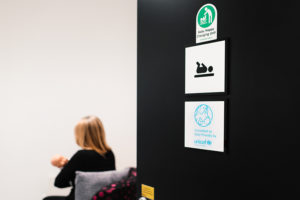Senior Lecturer in Midwifery
Faculty of Health, Education and Society
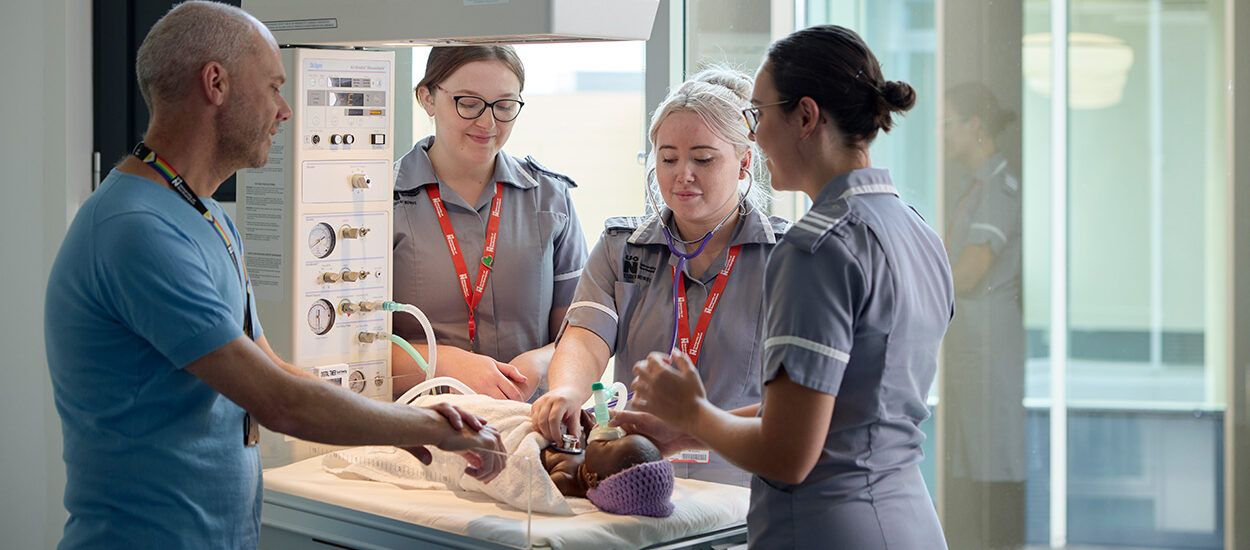
Midwifery BSc (Hons)
- Home
- Courses by subject
- Midwifery BSc (Hons)
Key Facts
-
UCAS Code
B720
-
Level
UndergraduateUG BSc (Hons)
-
Duration
3 years full-time
-
Starting
September, January
-
BBC at A Level
DDM at BTEC -
Full Time: £9,250
-
Waterside
Updated 11/10/2024
Get in touch
For questions regarding study and admissions please contact us:
UK/EU STUDENTS ENQUIRIES
Students on our Midwifery course will commence a curriculum based on the Nursing and Midwifery Council (2019) Standards for pre-registration Midwifery education. The 2021 curriculum continues to build on the University of Northampton’s innovative active blended learning approach and will centre on case studies helping you to explore the importance of cultural competence, evidence-led practice and professional caring to ensure students can provide effective midwifery care.
Top 10 For Midwifery & Nursing
Our Nursing and Midwifery courses are joined top 10 in the Daily Mail University League table for 2025.
Midwifery is a unique and rewarding career, that will allow you to be in the privileged position of working closely with pregnant persons, women and their families during pregnancy and childbirth, promoting health and wellbeing.
Our midwifery degree is approved by the Nursing and Midwifery Council (NMC) and accredited as Baby Friendly Gold by UNICEF.
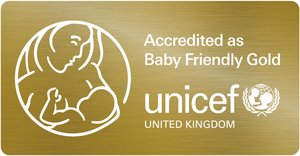
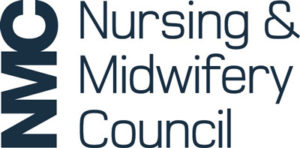
Highlights
- The Midwifery course leads to Nursing and Midwifery Council (NMC) registration.
- Learning facilitated in small groups to aid discussion and interaction; 3 practice learning partners.
- Maternity service users and advocacy groups integral to the curriculum.
- Simulated scenarios in skills labs and regular use of midwifery specific simulation models.
- Midwifery teaching staff from varying midwifery backgrounds including clinical practice, research and management.
- UNICEF Baby Friendly Gold Accredited.
- The faculty’s Interprofessional education (IPE) ‘collaborative curriculum’ provides opportunities to learn with, from and about students on 16 other health, education and social care programmes.
- Support from careers and employability service.
- You may be eligible for financial support through the NHS Learning Support Fund (NHS LSF)*
- Guaranteed paid internship with the Northampton Employment Promise.
- HP laptop and software included with this course for eligible students* (*see eligibility criteria and terms and conditions).

Waterside campus has everything students needs from: Learning Hub featuring 24/7 library, Creative Hub, on-site shop, restaurant, cafes and food outlets, multi-faith chaplaincy, student village hall, Students' Union and more. With only a short walk over the bridge into the town centre.
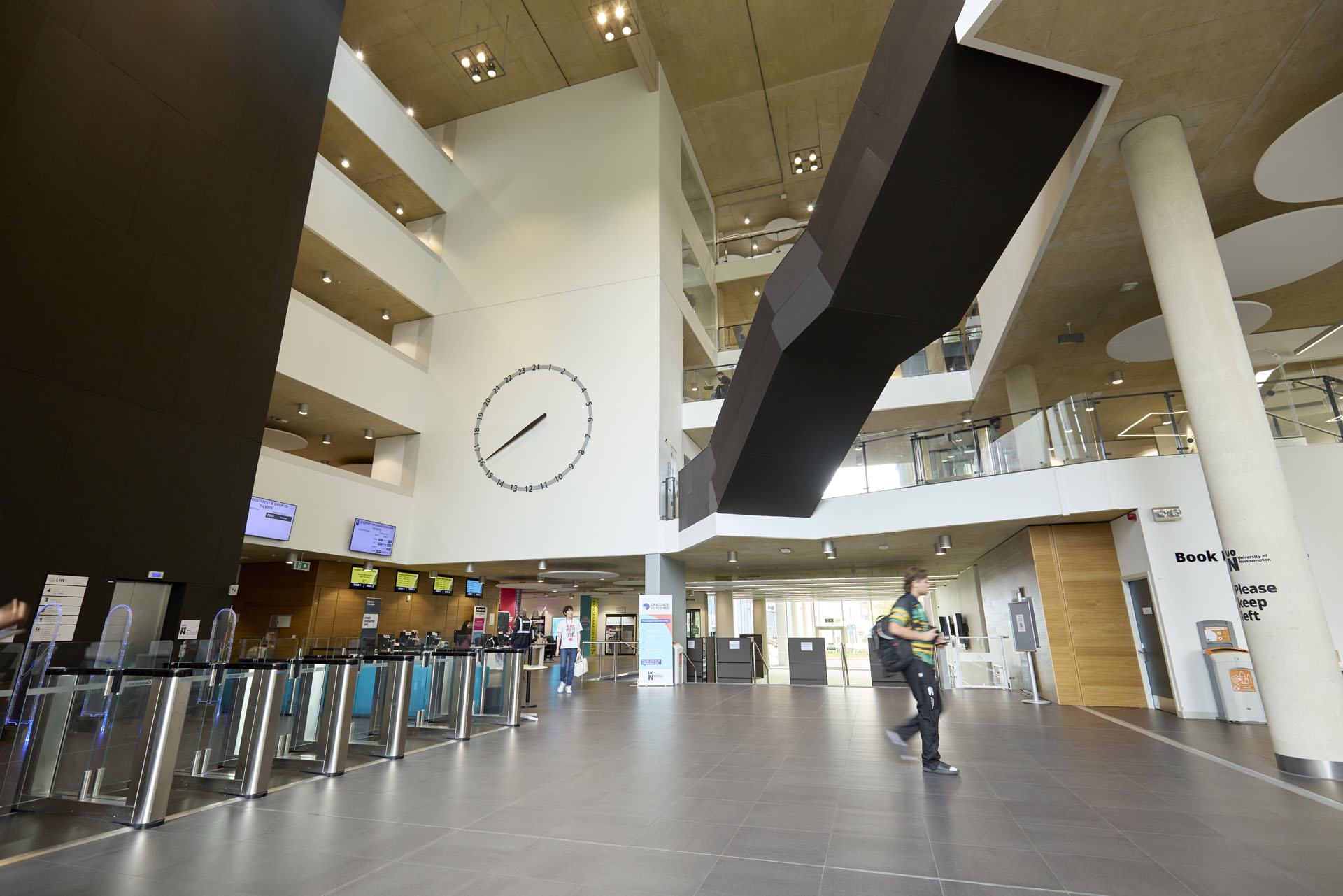
The Learning Hub and Student Information Desk would be a student's first point of call when needing support.

Our library covers three floors of the Learning Hub, with IT rich learning environments, including silent and group study spaces, physical books. Don't forget there are plenty more resources available online!
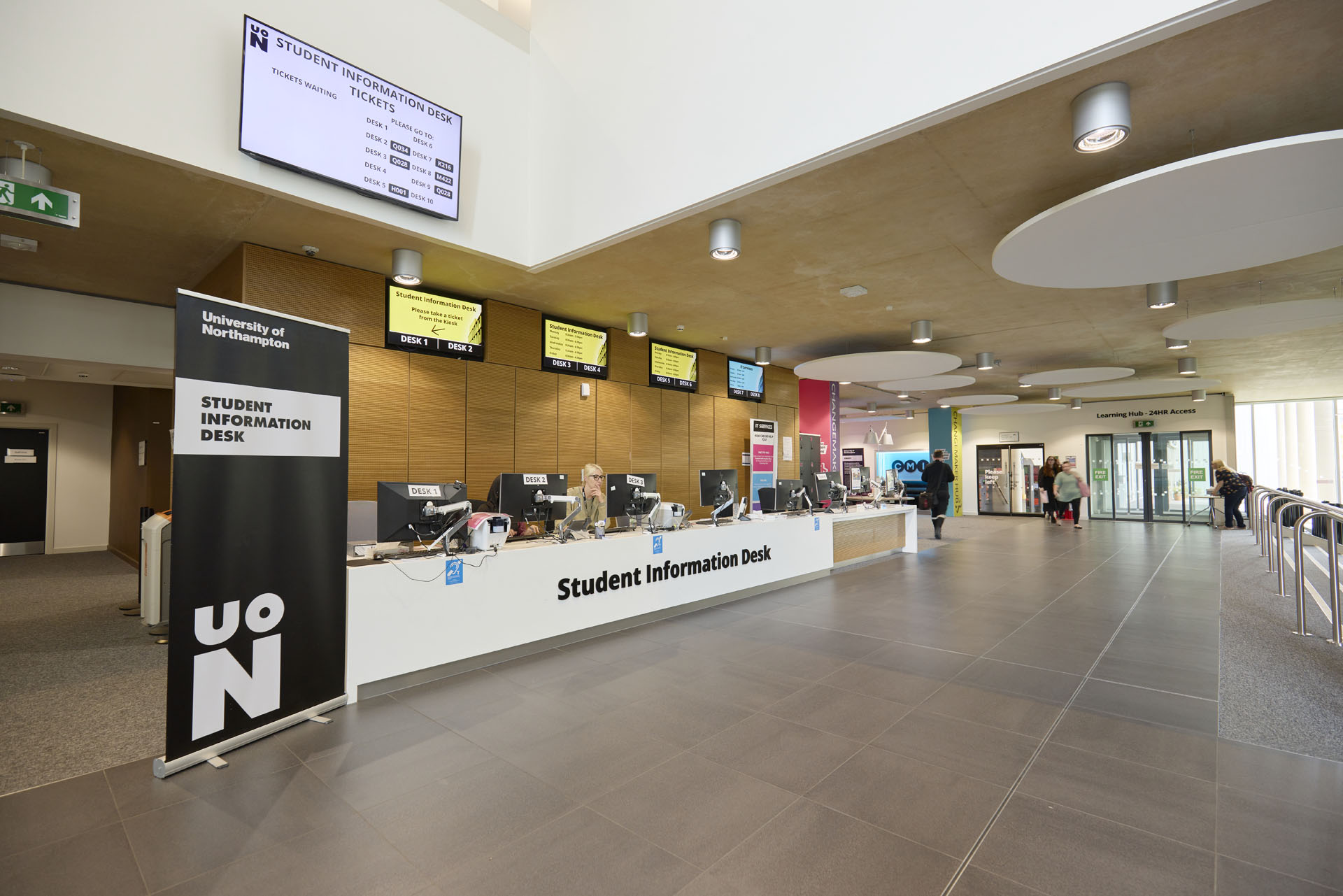
The Student Information Desk is the first place a student should go if they need any help. Here the team can direct you to academic support, mental health support, financial support, IT support, and more.

The Learning Hub is where every student will go for library support and classes, as well as food outlets and social events.
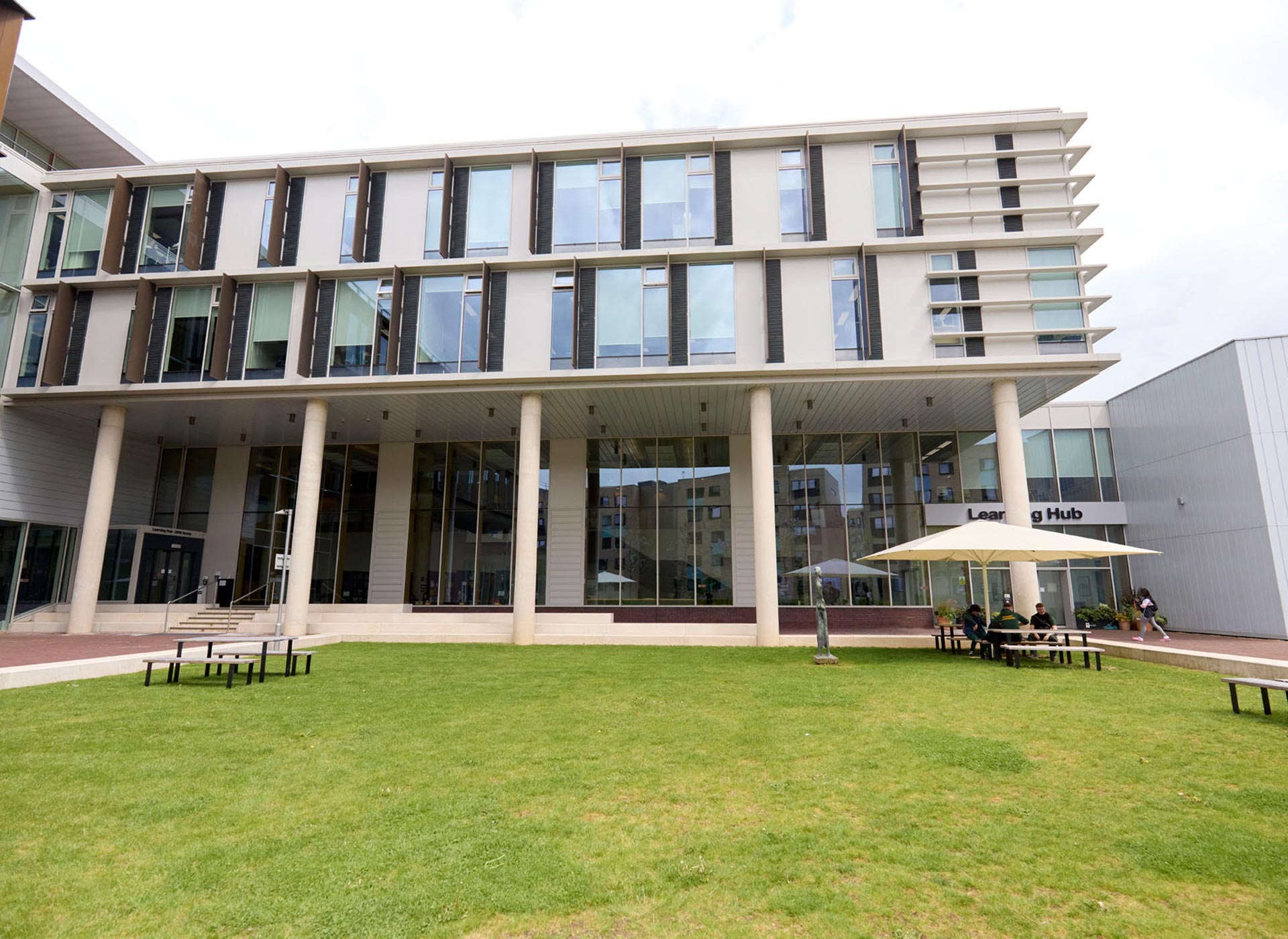
The Learning Hub also has lots of outdoor space for meeting with friends or finding some silent time between classes.
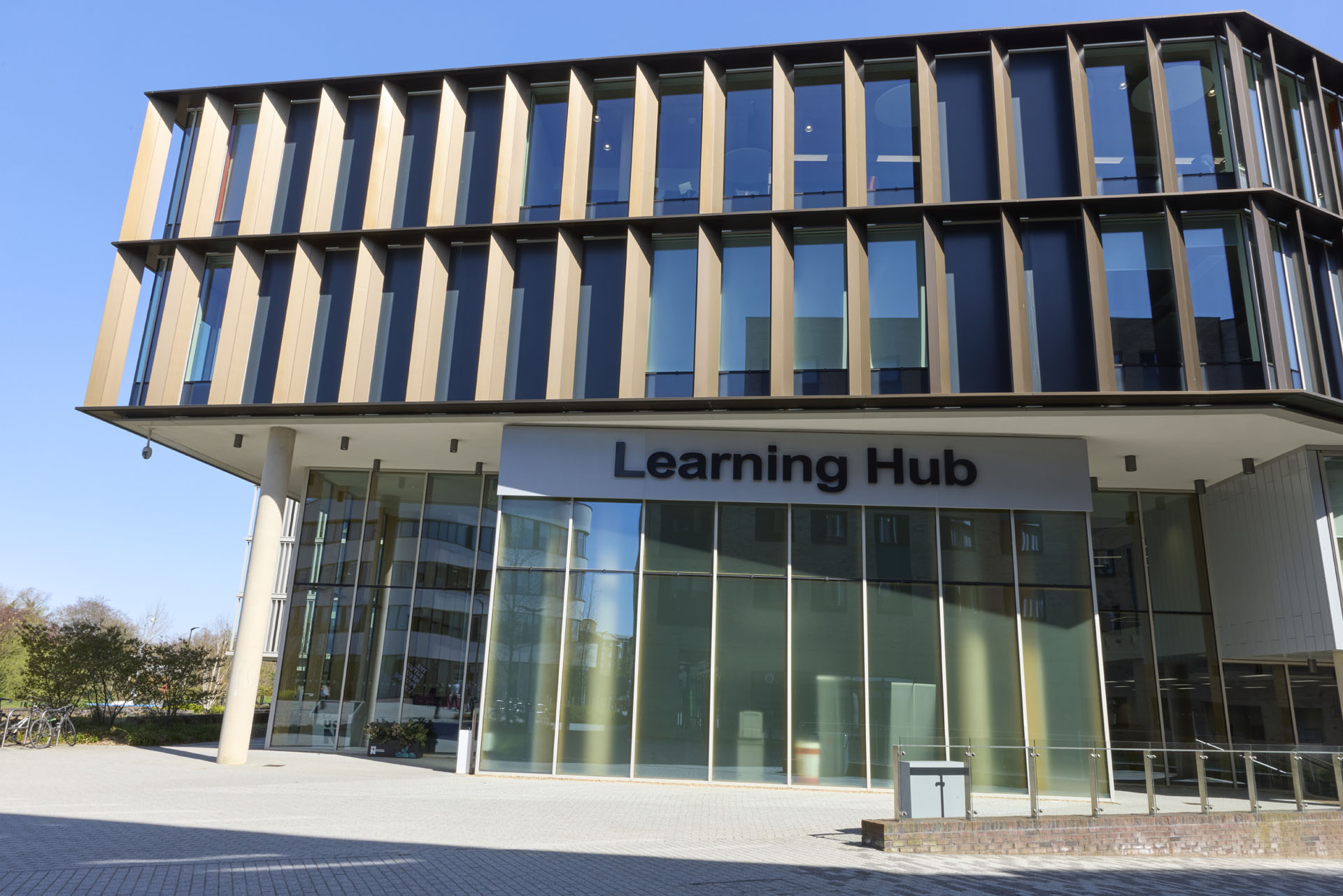
The Learning Hub is the biggest building on campus, home to our Student Information Desk, 24/7 library, teaching spaces, cafes, and more.

The big and spacious modern Senate building has various types of learning spaces, teaching rooms, our Bloomberg suite, Morley Room lecture hall, and cafes.
Entry Requirements
A typical offer would be for level 3 qualifications to be achieved in one of the following:
A Level
- A maximum of 3 A Levels needed with minimum grades of BBC or above.
- One A Level must be in a science which includes biology, chemistry, physics, psychology or sociology.
- General Studies is not accepted.
- The science A level needs to be achieved with a minimum B grade.
- Please note that AS (A1) levels and extended projects will not contribute to tariff points.
T Levels
- M grade in Science
Access Programmes
- Access programmes must consist of a minimum of 60 credits in total (15 at Level 2 and 45 at Level 3).
- Level 3 credits must be achieved at a minimum of 30 at Merit and 15 at Distinction achieved at level 3 in Science.
- Access programme should have a relevant science or health focus.
BTEC Studies/Cambridge Technical
- The award of two Distinctions and one Merit (DDM) or higher must be achieved.
- Awards must have a science focus, for example health and social care.
- Distinctions achieved must have a science focus.
We welcome applications from students with a mix of A levels and BTEC/Cambridge Technical qualifications.
-
In addition:
- You must have GCSEs that include Mathematics and English Language at grade C/4 or above or a recognised equivalent. It is not compulsory to have GCSE in Science if you have a Level 3 science qualification, but it is still desirable.
- Some healthcare work experience is desirable.
- Accreditation for Recognition of Prior Learning (RPL) is not considered for applicants to the BSc (Hons) Midwifery course.
- Evidence of completion of at least 12 years of general school education or possession of a certificate attesting success in an examination of an equivalent level, for admission to a midwifery programme.
We will consider other qualifications that are not listed above, please contact our Admissions team to discuss these on an individual basis.
All offers of a place on the programme will be made to applicants after completion of successful interview, and will be conditional subject to:
- a satisfactory enhanced Disclosure and Barring Service (DBS) check;
- a satisfactory occupational health check, including evidence of required immunisations that includes vaccinations for exposed Prone Procedures (EPP) via the University of Northampton’s Occupational Health provider. Please refer to the department of health document used by occupational health providers.
For more information on how to make an application, please visit our How to Apply page.
-
All International and EU students applying for a course with us must meet the following minimum English language requirements:
- IELTS 7.0 with no lower than 7.0 in Reading, Listening and Speaking as well as no lower than 6.5 in Writing for study at the undergraduate level.
For more information on the Nursing and Midwifery Council (NMC) English language entry criteria, please follow the NMC website.
For information regarding English language requirements at the University, please see our IELTS page.
Practice Opportunities
Practice opportunities will be within the maternity services settings in one of our NHS Trust Partner sites for 30 up to 37.5 hours per week, working with experienced midwives who will support you in their roles as practice supervisors and assessors. You will also have opportunities to work with midwives based in community hubs to develop your role within the multi-professional team and to promote shared learning.
As a student midwife you will be expected to participate in the full range of twenty-four hour care required of a registered midwife, both in hospital and community placements. Long days (between 10 and 12 ½ hour shifts), early, late and night shifts across a 7-day week, including weekends. In addition, you will have the opportunity to experience and participate in continuity of care and carer caseloading models, providing care in a variety of settings as well as being on-call for 24-hour periods to support birth.
Please note that you will need to have the ability to commute between your NHS Trust host site, the wider community and University locations.
Course Content
-
The midwife degree has been designed to contribute towards achieving the following United Nations Sustainable Development Goals: SDG3 of Good Health and Wellbeing and SDG5 Gender Equality.
Becoming a Midwife offers the chance to provide compassionate care, support women through childbirth, empower families, and make a positive impact on communities. To learn more about the midwifery profession, visit the NHS website.
The BSc Midwifery course at the University of Northampton enables support from our Careers and Employability service to ensure our midwifery graduates are well-prepared for employment.
Our Midwifery BSc teaching staff are enthusiastic, experienced midwives with a wide variety of expertise and are also skilled facilitators of learning. You will work in an environment that fosters key principles of adult learning, as well as individual support for your learning and skills development.
Our midwifery course provides a structure that allows the course team to deliver a curriculum for the education of student midwives to an appropriate clinical, professional and academic standard.
We have a clear framework for the learning and teaching of healthcare professional, through this framework we aim to train dynamic, effective and collaborative practitioners.
Completing the BSc Midwifery degree will give you the following skills and experience:
- you will be able to confidently lead the role of the midwife, employing a sound knowledge base through engagement with the research process and utilising a range of core and specialist midwifery skills;
- you will be able to build effective working relationships with other professionals and partnerships with women, pregnant persons and their families;
- provide holistic, woman-centred midwifery care promoting physiological processes, to include organising care for a small caseload;
- question and explore current practice to enable the continuous evaluation and development of effective midwifery care.
Throughout your midwifery course you will develop and enhance your clinical skills within all areas of maternity care (labour ward, home births and birth centres). You will also have the opportunity to experience care in a variety of multi-disciplinary settings and non-maternity settings which could include the special care baby unit (SCBU), Gynaecology, theatres and high dependency units (HDU).
List of modules:
Please note the modules shown here relate to the academic year 24/25. The modules relating to the academic year 25/26 will be available from June 2025.
-
-
Interprofessional Education (IPE)
Module code: FHS_IPE20Status: Compulsory
-
Foundations of Midwifery Care (20 Credits)
Module code: MID1025Status: CompulsoryThe purpose of this module is to enable the student to understand, apply and consolidate the principles of individualised care planning within the context of universal midwifery care. Students will apply a person-centred approach considering relevant physiological, psychosocial and cultural factors.
-
Participating in Clinical Midwifery Practice (40 Credits)
Module code: MID1026PStatus: CompulsoryThe purpose of this module is to enable the student, under direct supervision and direction, to provide safe universal midwifery care for women, newborns and families in a variety of models of maternity/midwifery care. Students will also begin to participate in the provision of care for women and newborns with additional care needs as part of the wider health and social care team.
-
Cultural perspectives in midwifery (20 Credits)
Module code: MID1027Status: CompulsoryThe purpose of this module is to enable the student to demonstrate understanding of the culture of midwifery and apply this to the provision of psychosocial and culturally appropriate maternity care.
-
Scholarly practice in midwifery (20 Credits)
Module code: MID1028Status: CompulsoryThe purpose of this module is to develop the student?s personal, professional and academic skills, including digital and technological literacy. Students will explore appropriate sources of information that underpin the midwife?s role in relation to public health agendas for women, newborns and the wider family.
-
Universal care needs applied to midwifery (20 Credits)
Module code: MID1029Status: CompulsoryThe purpose of this module is to develop the student?s knowledge and understanding of the underpinning anatomical and physiological systems and principles of pharmacology to support the provision of safe and effective midwifery care.
-
Interprofessional Education (IPE)
-
-
Additional care needs applied to midwifery (10 Credits)
Module code: MID2032Status: CompulsoryThe purpose of this module is to develop the students' knowledge and understanding of the underpinning pathophysiology of adult, fetal and newborn body systems and pharmacological principles applied to altered health conditions, to support the provision of safe and effective midwifery care for those with additional needs.
-
Contributing to clinical midwifery practice (50 Credits)
Module code: MID2033PStatus: CompulsoryThe purpose of this module is to enable the student to contribute, with decreasing levels of supervision and direction, to the provision of safe universal midwifery care for women, newborns and families in a variety of models of maternity/midwifery care. Students are also required to contribute to the provision of care for women and newborns with additional care needs as part of the wider health and social care team.
-
Cultural competence in midwifery (10 Credits)
Module code: MID2034Status: CompulsoryThe purpose of the module is to enable students to identify and explain barriers and facilitators to providing culturally competent midwifery care in a changing socio-political environment.
-
Developing Midwifery Care (30 Credits)
Module code: MID2035Status: CompulsoryThe purpose of this module is to enable the student to analyse and apply the principles of individualised care planning within the context of universal midwifery care and those with additional care needs. Students will apply legal, ethical and professional frameworks to inform a person-centred approach when considering complex physiological, psychosocial and cultural factors.
-
Research in Midwifery (20 Credits)
Module code: MID2036Status: CompulsoryThe purpose of this module is to enhance students? academic skills through critiquing local, national and/or international evidence surrounding socio-cultural issues relevant to professional midwifery care within the context of research. With a focus on advocacy for women, newborns and the wider family, students will develop a proposal for research.
-
Additional care needs applied to midwifery (10 Credits)
-
-
Consolidating Midwifery Care (30 Credits)
Module code: MID3029Status: CompulsoryThe purpose of this module is to enable the student to evaluate information from a variety of sources and apply this to autonomous midwifery practice. Students will focus on risk limitation and service improvement as leaders of care for those with universal and complex needs across the childbirth continuum.
-
Proficiency in clinical midwifery practice (60 Credits)
Module code: MID3030PStatus: CompulsoryThe purpose of this module is to enable the student to demonstrate proficiency, with appropriate supervision, in leading safe and competent universal midwifery care for women, newborns and families in a variety of models of maternity/midwifery care. Proficiency is also required in the provision and coordination of care for women and newborns with additional care needs as part of the wider health and social care team.
-
Independent Project (30 Credits)
Module code: MID4005Status: CompulsoryThe purpose of this module is to enable students to consolidate their skills as a colleague, scholar and leader in solving complex problems and making evidence-informed decisions by applying a range of research skills and methods within the arena of midwifery practice, care and/or services. They will consolidate skills of critical analysis, synthesis and evaluation of the literature to produce a project with the aim to promote positive outcomes and strive towards excellence in midwifery care.
-
Consolidating Midwifery Care (30 Credits)
-
You will have the opportunity to practice your midwifery skills using an active blended learning approach supported by sessions in a simulated environment in our dedicated midwifery clinical skills laboratory.
Each of the three years of the course comprise periods of theory and applied practice within semesters and you will be placed at the NHS Trust sites to gain practical experience:
- Northampton General Hospital NHS Trust
- Kettering General NHS Foundation Trust
- Milton Keynes University Hospital NHS Foundation Trust
Placements are organised by a central placements department at the University of Northampton and a designated Midwife at your allocated NHS Trust host site.
If you are studying the Midwifery course, you can expect to work and study for 37.5 hours per week over 45 weeks of the year 50% of your time will be dedicated to learning in clinical practice and the other 50% will be led by the lecturing team at the University using an active blended learning approach. This means you will have guided online theoretical study followed by discussion on its application to practice in face-to-face sessions with midwifery lecturers. There will also be dedicated time for self-directed study and reflection.
Practice hours when in placement will be on average 30 hours per week but may vary from week to week to accommodate shift patterns and continuity of care working.
For some placement periods in Years two and three, these may increase to 37.5 hours per week in order to prepare you to meet requirements of the regulator, the NMC, to ensure you are prepared for professional practice.
-
Nursing and Midwifery Council (NMC)

Our BSc midwife university degree has been approved by the Nursing and Midwifery Council (NMC). This means you can be confident that this programme meets the standards of education, training, conduct and performance required for midwifes in the UK.
After successful completion of this midwifery programme, you’ll be awarded an Honours degree and can register as a Midwife with the Nursing and Midwifery Council (NMC). This will allow you to practice in accordance with the NHS Constitution which is underpinned by the core NHS values.
UNICEF Baby Friendly Initiative accreditation

Our Midwifery course is also BFI accredited by UNICEF meaning that our students will be equipped with knowledge and understanding of infant feeding to UNICEF UK standards. This standard is internationally recognised as a mark of excellence as one of the top midwifery universities.
The university of Northampton first achieved UNICEF Baby Friendly Initiative accreditation in 2016. We were extremely proud to achieve re-accreditation successfully in 2019. Students who graduate with us have been educated to the high standards of UNICEF BFI which is an appealing attribute when seeking employment as a registrant.
The baby friendly initiative standards and content is threaded across theory and practice modules.
-
At the University of Northampton, everything we do, from funded trips to paid internships, is to give you everything you need to make a difference when you leave.
If you join our full-time Midwifery degree at the University of Northampton, you will receive a laptop when your course begins*. The laptops are built to a bespoke custom specification ideal for use in the seminar room, collaborative group work or studying at home.
Whatever your ambitions, we’re here to help you to achieve them. We’ll support you to identify the skills you’re learning during your course, find your strengths and secure practical experience so that when it comes to applying for jobs or further study you’ll feel confident in standing out from the crowd. We’ve created the Northampton Employment Promise because we are so confident that if you focus on your studies and complete one of our awards you’ll be highly employable by the time you graduate. Putting you in a great position to secure employment or continue your studies.
To check out the full list of perks, visit our Student Perks page or dedicated International Perks page.
* UK fee payers only (see Terms and Conditions for further details)
-
How many hours will I study?
If you are studying the BSc (Hons) Midwifery course you can expect to work and study for 37.5 hours per week over 45 weeks of the year. The course is divided into modules which run for different lengths across the academic year. Identified theory hours on the course are compulsory and will consist of a mixture of face-to-face contact in University, individual pre-class preparation, group work, blended learning and online activities.
Practice hours when in placement will be on average 30 – 37.5 hours per week but may vary from week to week to accommodate shift patterns and continuity of care working.
What to expect during my placement?
You will be expected to work a range of day and night shifts alongside a practice supervisor within a clinical setting. Depending on your year of study you will be expected to observe, participate and lead on clinical care provision under direct supervision. You will work within a range of maternity settings providing care throughout the childbirth continuum.
What is my weekly commitment on this midwifery course?
The Midwifery programme plan is organised in semesters. Theory blocks consist of face to face and online teaching 9-4pm Mon-Fri. Wednesdays are typically not utilised for teaching to allow for other commitments such as sport. Placement blocks will consist of rostered day and night shifts ranging from 7 hours to 12.5 hour shifts, depending on the placement running Monday to Sunday.
Interview Information
After applying via UCAS and meeting the entry requirements to study midwifery at the university, you will be invited to an interview. You will receive further information and the interview preparation instructions from us by email before your interview. If you have any questions, please email us at: interviews@northampton.ac.uk
Can I work while I study BSc Midwifery course?
You may find that part-time work is achievable on an flexible ad-hoc basis. However due to academic and clinical placement commitments stipulated by the Nursing and Midwifery Council (NMC) this can be difficult to achieve.
How will I learn?
The aim of our teaching and learning is to transform lives and inspire change. We want our students to achieve their ambitions and to improve society for the better through the application of their skills and knowledge. Our midwifery course meets national academic standards and in addition is accredited by the NMC.
At the University of Northampton, our students learn in small groups and through close interaction between staff and students. Our midwifery courses are designed for active learning on and off campus, in digitally rich environments that integrate ‘live’, real-time sessions with activities students can undertake where they like and at the time they choose. We call this approach Active Blended Learning (ABL).
Characteristics of Active Blended Learning:
- Close interaction with tutors, small group teaching and team work.
- Activities that reflect the workplace and accommodate learner needs.
- A future-focused, digitally rich learning environment.
- An impressive range of accessible and up-to-date online resources and materials across all subject areas.
- Access to information and resources that is straightforward, consistent and reassuring.
- A supportive culture of motivation to progress and succeed, with students’ personal tutors playing a key role.
- A focus on academic and social belonging opportunities, including mentoring and peer support mechanisms.
A wide range of assessment is used on the BSc (Hons) Midwifery programme including essays, presentations, written and spoken examinations and projects, many of which will be submitted and marked electronically / online.
What other opportunities are available?
Our University is a part of a well-established, professional European network for Nursing and Midwifery. The Florence Network offers opportunities for future health careers and development to staff, academics and students. For more information go to the Florence Network google site.
How will I be assessed on the Midwifery course?
A wide range of assessment are used on the BSc (Hons) Midwifery degree including essays, workbooks, projects, both written and spoken examinations, care studies and presentations, many of which will be submitted and marked electronically / online.
What are the requirements in order to pass a module?
In order to pass a module a student is required to obtain a minimum grade of ‘D-‘ in all assessments as this is a professional requirement. There is no compensation between assessments or between theory and practice.
Student Story
"I’ve developed interpersonal skills and resilience and have improved my communication skills vastly as I’ve progressed through this course." "I’ve been offered a job at my placement host site and I’m very much looking forward to starting my new role once I qualify." - Hauwa Hamza -
Fees and Funding
2024/25 Tuition Fees
Fees quoted for the midwifery degree relate to study in the Academic Year 24/25 only and may be subject to inflationary increases in future years.
- UK – Full Time: £9,250
-
Examples of additional costs that you may incur during the three years of the programme include:
- living costs: for example, travel or fuel costs, running a car costs, car parking at NHS Trust host sites (ranging at present from 50 pence per day to £10 per day) and accommodation costs.
- subscriptions: to a professional body/union, one example being, the Royal College of Midwives Membership (currently £1.67 for student midwives), Professional Midwifery journal(s) (approximately £40.00 annually for per subscription). These costs are optional.
- purchase of learning resources: stationery.
- miscellaneous: additional uniforms for clinical practice (approx. £25), fob watch, non-attendance at mandatory training (approx. £85), shoes for practice.
-
Students, studying nursing, midwifery and many of the allied health professions courses from September 2020, may be eligible for a payment of at least £5,000 a year which they will not need to pay back. They may be able to apply for Financial support at the university through the NHS Learning Support Fund (NHS LSF) which offers eligible students additional support while studying for their degree. This is in addition to the Student Loan from the Student Loans Company.
Financial contribution towards your travel, and expenses in relation to your practice learning opportunities, may be available to you from the NHS Learning Support Fund. Details, including eligibility criteria, can be found on the NHS website.
*The information provided above is correct for the academic year 2024/25 but please check the NHS LSF website for full details, any changes and updates.
For more information about possible funding options, please visit our Fees and Funding pages.
-
Fees quoted relate to study in the Academic Year 23/24 only and may be subject to inflationary increases in future years.
- UK – Full Time: £9,250
Staff
Careers and Employability
For those studying midwifery at university, career opportunities are wide ranging upon qualification, within and outside of the NHS.
Initially after a period of preceptorship training and post-registration clinical experience, you can progress into fields such as clinical leadership, specialisms such as bereavement, teenage pregnancy and infant feeding, as well as education and research. Employment opportunities are available both in the UK and abroad.
Postgraduate and Master’s Opportunities
Our Master’s courses are a great way to enhance the skills you have already learnt. Benefit from our 20% alumni discount .
Successful completion of this course could lead on to one of our Master’s programmes: MSc Public Health, MSc Advanced Clinical Practice.
At the University of Northampton, we offer a range of short courses and continuing professional development (CPD) programmes. These will enable you to learn new skills, progress into specialisms or take on new responsibilities.
Facilities
Our midwife degree students have the opportunity to learn simulated practice using equipment within our specialist skills labs. This provides them with an environment to learn and be introduced to midwifery skills before developing them out in practice.
Our Midwifery team have been awarded Gold from UNICEF’s Baby Friendly Initiative (BFI). Read more about the accreditation and how it enhances Midwifery students experience while studying.
Related Courses
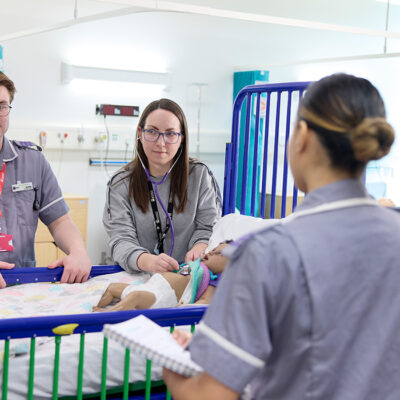
Children and Young People’s Nursing BSc (Hons)
Children and Young People’s Nursing will provide you with the capability to cope with a demanding...
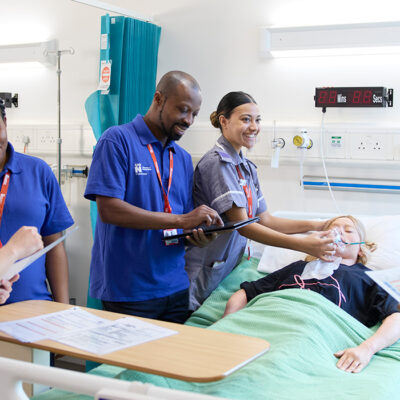
Adult Nursing BSc (Hons)
Our nursing course will give you the ability to cope with a demanding and satisfying profession...

Mental Health Nursing BSc (Hons)
See the service from the patient’s perspective and learn how you can make positive changes through...
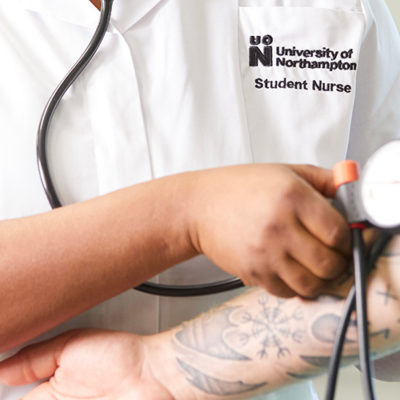
Nursing Associate FdSc
This is a 2 year full time FdSc with a 50/50 split between theory and practice...
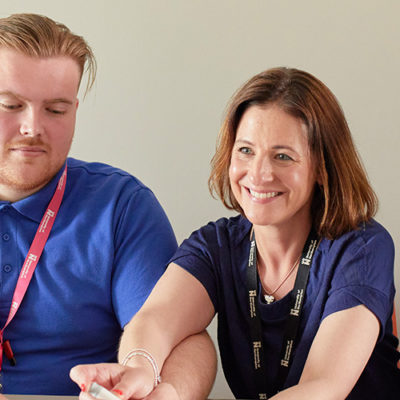
Learning Disability Nursing BSc (Hons)
Our course course will develop your understanding of the needs of people with learning disabilities to...
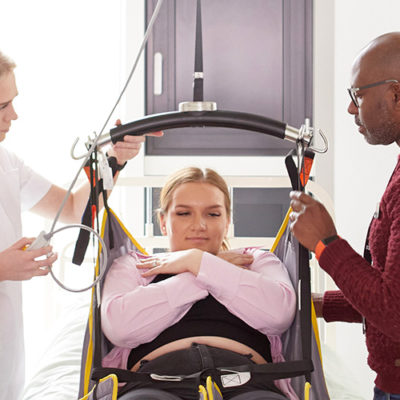
Occupational Therapy BSc (Hons)
The BSc (Hons) Occupational Therapy degree prepares you to work as a registered occupational therapist in...











